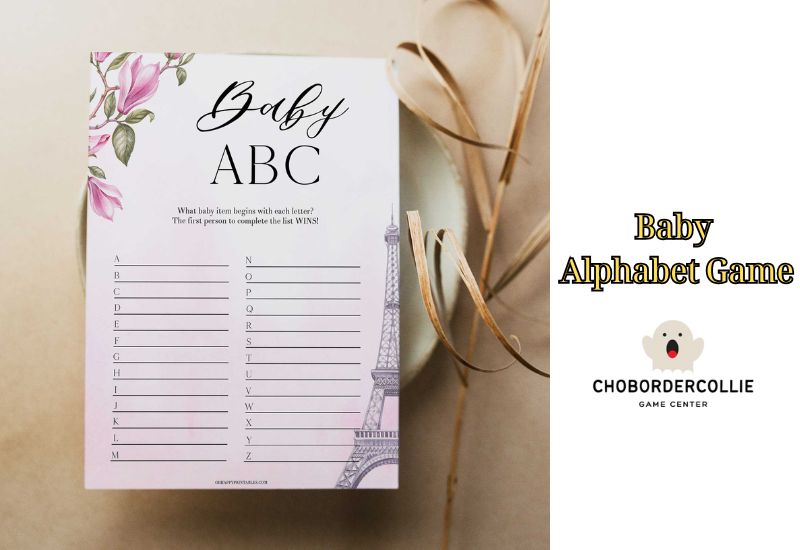College Girls Team Fashion Makeover
Published on November 14, 2024

Learning the alphabet is one of the first major milestones in a child’s educational journey. For young learners, the right tools can make the process enjoyable and effective. One of the best ways to introduce children to letters and sounds is through interactive games. The Baby Alphabet Game is a fantastic option that blends fun and learning, making it a popular choice for parents and educators. Chobordercollie.com will explore what the Baby Alphabet Game is, how it works, and why it is beneficial for early childhood development.
The Baby Alphabet Game is a fun and educational tool designed to help young children learn the alphabet in an engaging way. The game typically involves colorful graphics, fun sounds, and interactive elements that appeal to children’s natural curiosity. In this game, children are introduced to each letter of the alphabet, often through playful activities such as matching letters with pictures, learning letter sounds, and engaging in mini-games related to each letter.
The Baby Alphabet Game can be found in various formats, including mobile apps, online games, and educational software. It is widely available for both iOS and Android devices, as well as on websites that offer free educational content for young children.

The gameplay of the Baby Alphabet Game is designed to be both educational and fun. It typically consists of a series of activities that teach children the letters of the alphabet, the sounds they make, and how to recognize them in different contexts. Here’s a breakdown of how these games usually work:
The game introduces each letter of the alphabet, often in both uppercase and lowercase formats. Children may be asked to identify the letter by tapping on the correct one when shown among a set of choices. In some cases, the game will show pictures of objects that start with that letter (e.g., “A” for Apple, “B” for Ball), reinforcing the connection between the letter and the objects it represents.
In addition to recognizing letters, the game will often teach the phonetic sounds associated with each letter. For example, when a child clicks on the letter “C,” the game may say “C is for Cat” and play a sound effect of a cat meowing. This approach helps children learn not only the shape of the letter but also its sound, which is essential for early reading skills.
Another common feature of the Baby Alphabet Game is a matching activity where children are asked to match letters with pictures of objects that begin with those letters. For example, the child may be asked to match the letter “D” with an image of a dog or a duck. This reinforces both letter recognition and vocabulary building.
To keep the game exciting and interactive, many Baby Alphabet Games feature mini-games that provide challenges related to the alphabet. For example, children may be asked to complete puzzles, put together jigsaw pieces of letters, or play “find the letter” games. These challenges encourage problem-solving and critical thinking, while also reinforcing alphabet knowledge.
The Baby Alphabet Game is more than just a fun way to pass the time; it offers numerous educational benefits for young children. Here are some key advantages of incorporating the Baby Alphabet Game into your child’s learning routine:
The primary benefit of the Baby Alphabet Game is its ability to promote early literacy skills. Learning the alphabet is a crucial step toward reading and writing, and the game helps lay a strong foundation for these skills. By learning the names and sounds of the letters, children are better prepared for future reading development.
As children interact with the game, they are practicing memory recall and cognitive thinking. They are constantly challenged to remember the letters and the associated sounds, which strengthens their ability to retain information. Matching games and puzzles also help improve problem-solving skills and hand-eye coordination.
The Baby Alphabet Game encourages children to learn independently. As they engage with the game, they develop a sense of accomplishment when they complete tasks or progress to new levels. This boosts confidence and motivates them to continue learning.
The colorful visuals, interactive elements, and imaginative characters featured in the Baby Alphabet Game inspire creativity and spark the imagination of young learners. Through games that include fun sound effects and animations, children can explore a world of possibilities while building their knowledge of the alphabet.
Perhaps the most important benefit is that the Baby Alphabet Game is simply fun! Children are naturally drawn to the game’s playful elements, which keeps them motivated to learn. When kids are enjoying themselves, they are more likely to stay engaged and retain the information they are exposed to.
By learning the alphabet in an enjoyable and interactive way, children develop early reading skills that are crucial for their academic success. The game helps prepare children for future learning experiences, making it easier for them to excel in school.
The Baby Alphabet Game is available on various platforms, including iOS, Android, and web-based games. You can find a wide variety of options in app stores like the Apple App Store and Google Play Store, where there are free and paid versions of the game. Many educational websites also offer online versions of the game, allowing children to access the game without the need for a download.
These games are easily accessible and can be played on smartphones, tablets, or computers, making it convenient for children to learn anywhere, anytime. The ability to download the game to mobile devices ensures that kids can enjoy the game while traveling or waiting for appointments.
The Baby Alphabet Game is an excellent tool for introducing young children to the world of letters, sounds, and early literacy. Through fun, interactive gameplay, the game makes learning the alphabet engaging and enjoyable. Not only does it help children build essential skills for reading and writing, but it also fosters creativity, problem-solving, and independent learning.